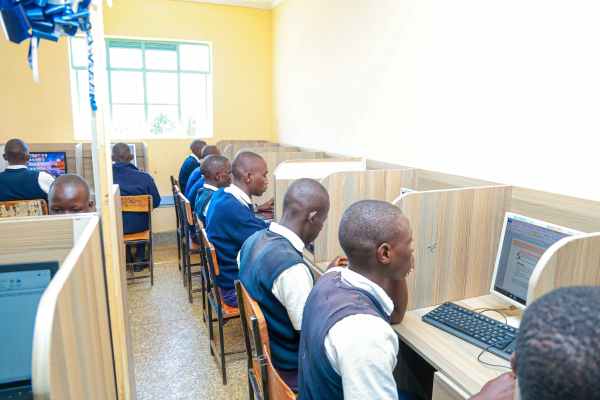
Huawei advances digital literacy in Kenya with new ICT lab
Huawei Technologies Kenya has inaugurated a new ICT lab at St. Stephens Namasoli Secondary School in Khwisero Constituency, Kakamega County, reinforcing its commitment to digital inclusion and equitable access to education.
Speaking during the inauguration, the National Assembly Speaker Moses Wetang’ula lauded the initiative for empowering students and bridging the rural-urban ICT literacy divide.
“A heartfelt thank you to Huawei Technologies Kenya for donating computers and equipment to schools. This generous support empowers our students with essential ICT skills, giving them equal opportunities to thrive in the digital age. It will also reduce disparities in ICT literacy between rural and urban areas, giving all students a level playing field.”
As part of this initiative, Huawei donated 30 state-of-the-art computers and a 60-inch Max Hub smart teaching screen, providing students and teachers access to cutting-edge digital learning tools that will enhance ICT skills development.
Huawei’s investment at St. Stephens Namasoli is complemented by its innovative digital literacy programs such as Digitruck and DigiSchool. These mobile and school-based initiatives bring ICT training and resources directly to underserved rural and urban areas, playing a critical role in supporting Kenya’s national ICT literacy goals.
Since its launch in 2019, Huawei’s DigiTruck program has made a significant impact, training over 6,240 youth across 39 counties.
In 2025 alone, more than 680 youth have completed the program, including 180 recent graduates from Baringo County.
This milestone follows successful DigiTruck sessions in Migori and Homa Bay Counties, where 210 youth (95 women and 115 men) graduated at Uriri Vocational Training Centre, and 290 youth (143 women and 147 men) completed training at Oriwo Boys High School.

These figures underscore DigiTruck’s vital role in expanding access to ICT skills and empowering Kenya’s next generation of digitally skilled workers.
According to the World Bank’s 2023 report on digital inclusion in Kenya, only 38% of rural youth possess basic ICT skills, compared to 67% in urban areas, highlighting a significant literacy gap that limits equitable access to digital opportunities.
Additionally, the World Bank’s Future Workforce report emphasizes that over 60% of jobs in Kenya by 2030 will require advanced digital and cognitive skills, underscoring the urgent need to prepare youth for a rapidly evolving labor market.
Huawei’s programs actively address these disparities by increasing access to technology and digital training, enabling youth from diverse backgrounds to gain vital skills necessary for the future of work and a digital economy.
“Our vision is clear: to leverage technology as a catalyst for social transformation,” said Khadija Mohammed, Media & Government Relations Director at Huawei Kenya. “By supporting programs like Digitruck and DigiSchool alongside investments in physical ICT infrastructure, we are building a sustainable ICT talent pipeline that aligns with Kenya’s ambition of fostering a digitally-skilled youth, ready to thrive in a growing digital economy,” added Khadija.
Huawei remains steadfast in its mission to empower Kenyan youth and drive national development through technology-enabled education, helping pave the way toward a more inclusive, innovative, and prosperous digital future.
